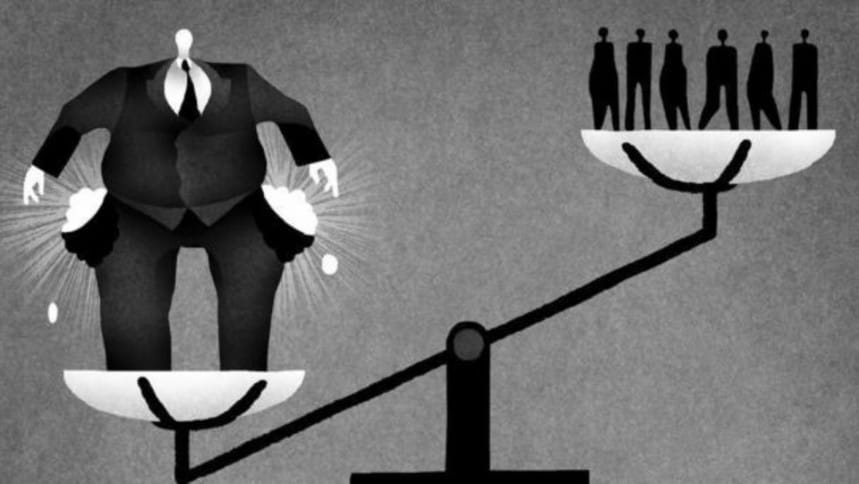Hardly any mention of yawning inequality

The story of Bangladesh's economic growth is predicated on solid ground. But some of its facets offer an interpretation that tells a different story if you look at it from the angle of equality. Despite an average growth of six percent per annum over the past two decades, its benefits are yet to trickle down to the poor.
Many expected that the budget for the next fiscal year would provide some respite for those who find it increasingly difficult to eke out a living with inflation hitting new heights almost every month. Although there is a lot to rejoice for the rich, there is none for the poor.
Many government measures relating to tax, some of which were proposed in the budget announced yesterday, will only widen the gap between the poor and the rich.
In his budget speech, the finance minister hardly mentioned the issue of growing inequality even though recent data released by the Bangladesh Bureau of Statistics demonstrates a rising trend of inequality.
Economists think that the government's tax system is not progressive because it depends more on indirect tax than on direct tax. Indirect tax is levied on goods and services while direct tax is imposed on income.
"Growing inequality is a normal tendency in a growing economy, but the government should put in place mechanisms to counter it," said Zaid Bakht, a former Research Director of the Bangladesh Institute of Development Studies (BIDS).
Mechanisms to counter inequality include increasing direct tax and widening the tax net, added Bakht, also chairman of Agrani Bank.
The share of indirect tax on the government's total revenue rose from 65 percent in 2021-22 to 69 percent till February 2022-23.
In the budget for the next fiscal, the government has proposed increasing indirect tax by imposing value added tax on many necessary goods, which, economists believe, would further deepen the inequality.
The government has proposed increasing VAT from 5 percent to 7.5 percent on plastic tableware and kitchenware, housekeeping products and sanitary ware. It has also proposed imposing higher VAT on toilet and facial tissues.
Most of these products are used by low income people, say economists, adding that although the number of people filing tax returns has increased, the gap between registered tax payers and tax return filers is still a matter of concern.
Until April in the current fiscal, the National Board of Revenue received 31.7 lakh tax returns from taxpayers, whereas the total number of registered taxpayers is around 88 lakh, according to the NBR.
According to recent data released by the BBS, Bangladesh's Gini coefficient, the economic measure of equality, stood at 0.499 in 2022, which is alarmingly high. The Gini coefficient is measured on a scale of 0 to 1. The closer it is to 1, the higher the inequality in society. If it is closer to 0.50, it is considered as manifesting high rates of inequality.
From 1973 to 1996, the Gini coefficient ranged from 0.36 to 0.39. It has since started to rise, according to BBS.
The reasons for growing inequality involve policy-making, tax regulations and corruption, said Prof Rashed Al Mahmud Titumir, chairman of the Department of Development Studies at the University of Dhaka.
Prices of utilities rose several times last year, which means people in lower-income groups will need to spend more on them. The government could provide relief to the low-income groups by announcing a minimum threshold of utility use free of charge, explained Titumir.
"Price hikes of many products are aligned with the world market but when things come back to normalcy in the global market, prices in our country do not drop," said Titumir.
Corruption also enhances inequality in society, he said adding that the government takes up projects and some people make money through corruption during the implementation phase.
Rizwanul Islam, an economist and former special advisor at International Labour Office, Geneva, said increasing indirect taxes like VAT and import duty badly affects low-income consumers because they are paying these taxes at the same rate as the rich.
Reduction in corporate tax is another example of measures that are designed to help the rich, he said.
The government has proposed reducing corporate tax for all companies by 2.5 percentage point in the current fiscal year.
This kind of policy not only increases inequality, they help exacerbate it, Islam added.

 For all latest news, follow The Daily Star's Google News channel.
For all latest news, follow The Daily Star's Google News channel. 



Comments